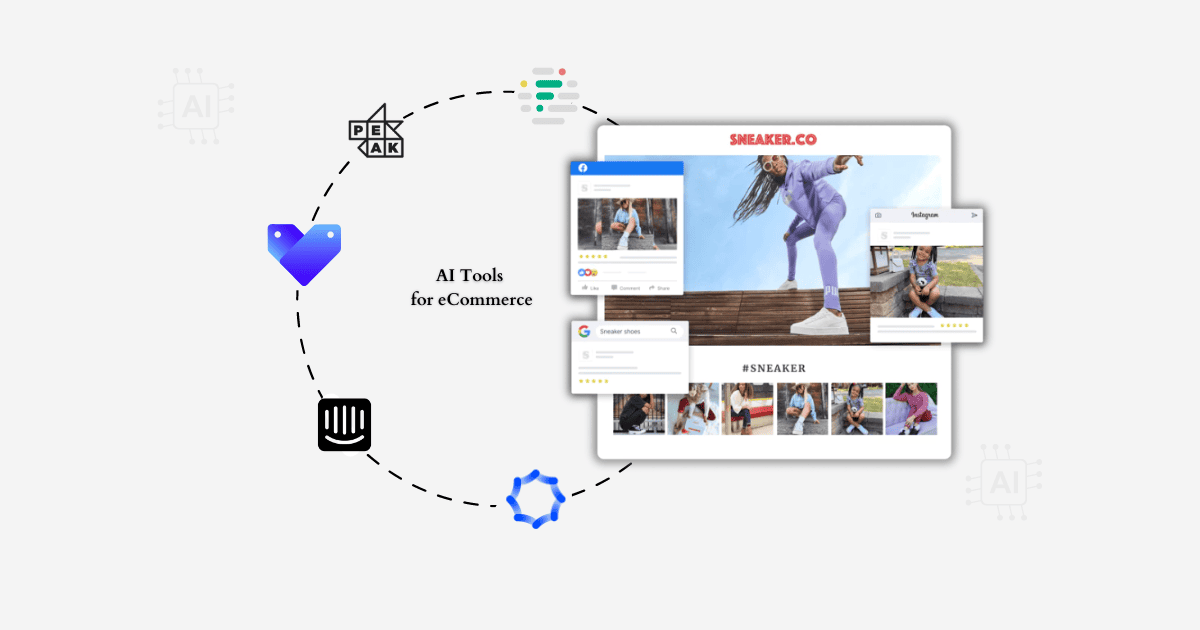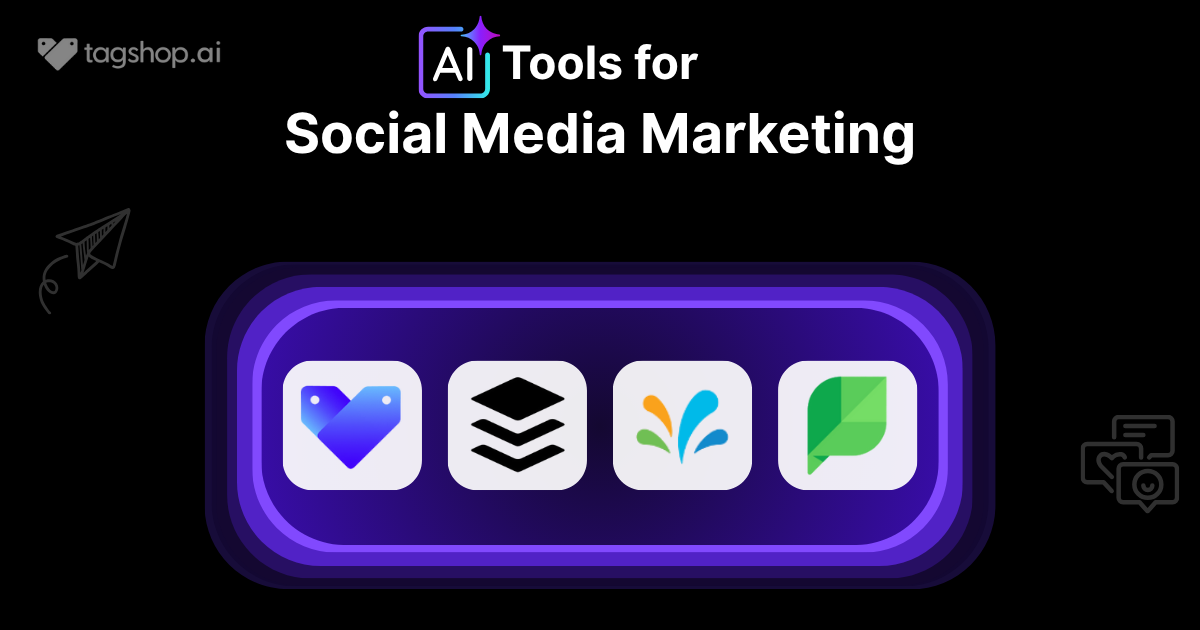20+ Best AI Tools for Ecommerce Brands in 2026
Uploading products, managing inventory, providing 24/7 customer support, and creating a website.
This task list goes on longer and longer when running an e-commerce business.
Thankfully, the rise of AI in e-commerce, along with Machine Learning, has made the process easier. One of the primary roles of emerging technology is to minimize manual efforts in business while increasing efficiency and accuracy.
As a result, e-commerce has seen a wealth of opportunities since the AI and ML industry opened up to it. Let us look at the best AI tools for e-commerce businesses and their scope.
What is an AI?
People often use “AI” and “Machine Learning’ interchangeably. The confusion is understandable, as both are closely related. Artificial intelligence is the simulation of human intelligence processes by machines, especially computer systems.
These processes include learning (acquiring information and rules for using the information), reasoning (using rules to reach approximate or definite conclusions), and self-correction.
Machine learning is a branch of artificial intelligence that focuses on developing algorithms and models that enable computers to learn and make predictions or decisions without being programmed. In other words, machine learning allows computers to analyze and interpret data, identify patterns, and continuously improve their performance.

The way people shop has changed, and so has business interaction. Gone are the days when business owners depended on a single advertisement to bring in sales. Today, they want to interact with their target market at every touch point and simplify the process. As a result, AI tools have entered the world of e-commerce.
What are the Benefits of Using AI in eCommerce?
Many large e-commerce companies have already incorporated AI into their e-commerce strategies. This helps streamline their operations and maximize their business potential.
Let’s examine the benefits of utilizing AI tools in e-commerce, which are excellent alternatives to Quillbot. Note that the benefits of using AI in e-commerce are not limited to the ones mentioned. It depends on the given tools and their scope.
1. Product recommendations
Many AI tools can help users increase their average order value. AI tools can also influence customers’ purchase decisions using data and information based on their previous orders, likes, and browsing habits.
Many AI tools can help users increase their average order value. AI tools can also influence customers’ purchase decisions using data and information based on their previous orders, likes, and browsing habits.
Businesses seeking to maximize the potential of such tools can benefit from digital marketing courses or artificial intelligence course which offer insights into leveraging AI for personalized customer interactions and enhanced data integration. Businesses can effectively utilize product recommendations to increase their average order value through strategies such as data integration.
2. Better Customer Service through AI Chatbots
As the demands increase, patience becomes scarce. As a result, it becomes difficult for businesses to be responsive and provide fast customer service.
With the help of AI-driven customer service chatbots, businesses can maintain ongoing conversations with their target customers to address any specific queries.
An intuitive AI chatbot development can also help provide a personalized customer experience by directing customers to product pages or the FAQ section.
3. Better Visual Presentation
Visual presentation has become essential to selling a product or service. Fortunately, many AI-driven graphic design tools can simplify the process of creating social media posts.
Best AI Tools for Ecommerce
Let’s explore the best examples of AI tools for e-commerce businesses, how they can benefit the business, and what scope of transformation they have in the e-commerce industry.
1. Tagshop: AI Video Ad Creation
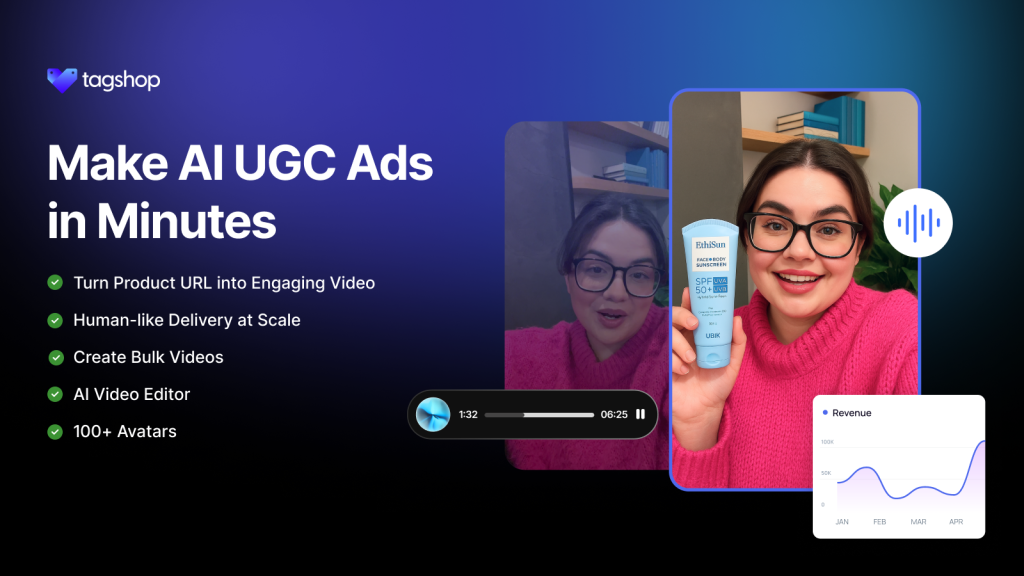
Tagshop is an AI ad creator that enables brands to create, manage, and scale high-performing video ads using AI avatars and voiceovers, without relying on authentic influencers or production teams.
It combines the power of authentic-looking content with advanced AI to help brands produce scroll-stopping videos for platforms like Instagram, TikTok, Facebook, and YouTube.
Key Features of Tagshop AI
1. AI Avatar Video Creation
Generate videos featuring hyper-realistic AI avatar that act, speak, and behave like real users—perfect for testimonials, reviews, or explainer videos.
2. Script-to-Video Automation
Turn any product script or pitch into a fully rendered video with just a few clicks. Tagshop handles everything from avatar delivery to visuals and voiceovers.
3. Multi-Lingual AI Voiceovers
Choose from a range of natural-sounding AI voices in various languages and accents, enabling you to localize content for global audiences.
4. Product-Driven Content Generation
Upload product images or information, and the platform automatically generates videos that highlight your product’s features in a natural, ads format. Check out the best AI content creation tools.
5. Authentic-Looking UGC Style
All videos mimic the casual, conversational tone and format of real user-generated content—ideal for building trust and boosting ad engagement.
6. Platform-Specific Video Formats
Easily export videos in aspect ratios and durations tailored for Instagram Reels, TikTok, YouTube Shorts, Facebook Ads, and more.
Edit scripts, avatars, or styles in minutes—perfect for performance marketers who need to test multiple ad variations fast.
Must Read: What is AI UGC: Types and Benefits
2. Getgabs
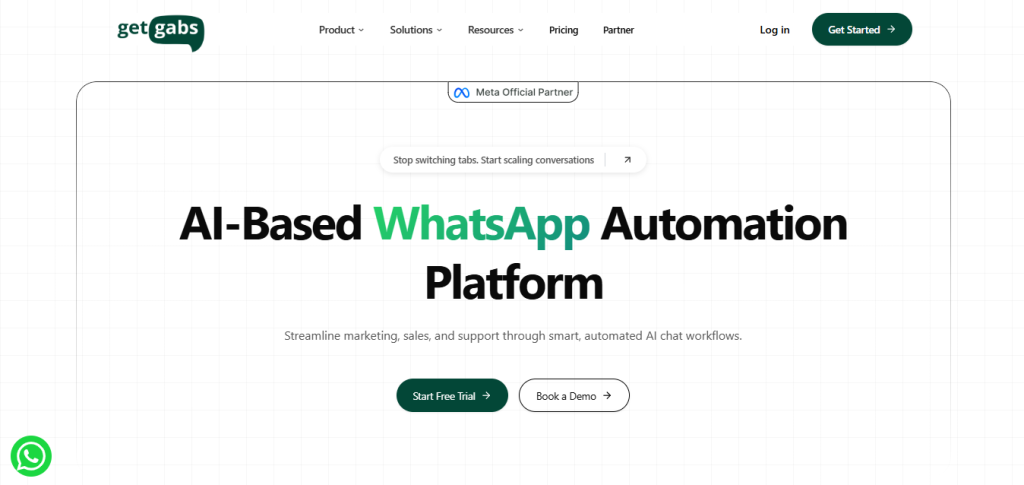
Getgabs is an AI-driven omnichannel marketing platform that connects with key communication tools, such as Instagram and WhatsApp, enabling businesses to automate processes and elevate their e-commerce presence. The platform offers multiple features to simplify business messaging with a number of customers. This is ideal for businesses that seek to send messages in bulk, automate conversations, integrate WhatsApp with CRM, and launch click-to-WhatsApp ads.
Alongside, the platform has comprehensive features, from running marketing campaigns, analytics dashboards, creative inbox, and sending bulk messages. The feature makes your marketing more meaningful and easier to manage.
It’s a perfect platform for e-commerce marketing to simplify customer engagement on platforms. It further improves agent productivity, making the right choice to boost customer satisfaction and operational efficiency.
3. ControlHippo
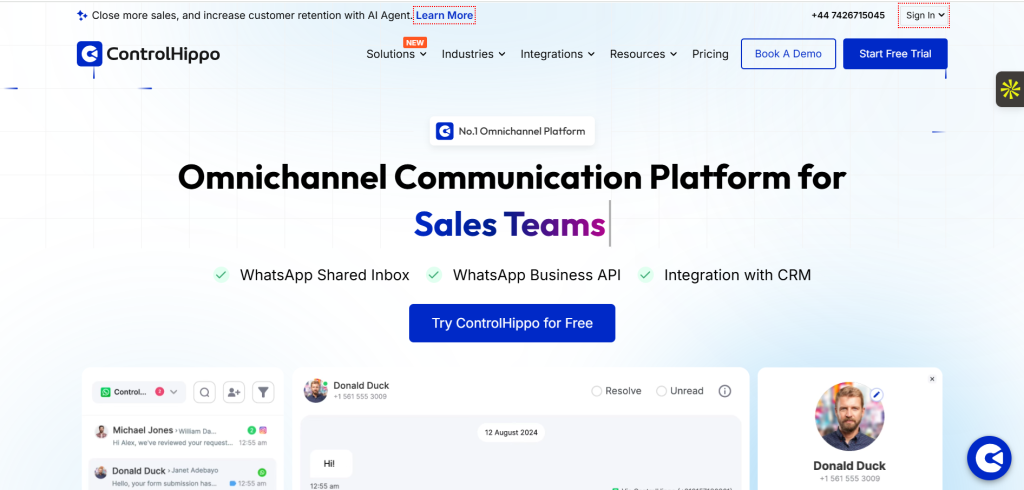
ControlHippo is an AI-driven customer communication platform designed to elevate eCommerce support with powerful automation and seamless integrations. It offers auto-reply configuration, AI-powered knowledge base, and virtual assistant handoff for efficient query resolution.
ControlHippo supports multi-channel chat and omnichannel integration, including WhatsApp Business API (WABA) media sharing and Shopify integration to streamline customer interactions across platforms. Key features like customer satisfaction score (CSAT) tracking, automated ticket creation with Zoho Desk, CRM system integration, and workflow automation empower teams to deliver personalized support.
Additional tools such as chat assign notifications, chat list filters, private notes, chat transcript downloads, and bulk messaging make managing customer conversations easier than ever. ControlHippo’s AI copilot further enhances agent productivity, making it an ideal solution for eCommerce businesses aiming to boost customer satisfaction and operational efficiency.
4. 10Web

10Web is an all-in-one AI-powered platform built for eCommerce brands looking to launch fast. From its Logo Maker to its AI website builder and automated hosting, 10Web helps users create a complete online presence- no design or coding skills required.
It offers an intuitive drag-and-drop editor, performance-optimized hosting on Google Cloud, and built-in tools for SEO, website loading speed optimization, and security. Designed for agencies, freelancers, and business owners, 10Web streamlines the entire web development process – reducing time, cost, and technical complexity while ensuring high performance and scalability.
5. Adobe Sensei: Provides AI-powered tools

Adobe Sensei is another great AI tool for e-commerce on the list. It is part of Adobe’s suite of AI-powered tools. This tool aims to automate and streamline workflows. It uses machine learning algorithms to analyze and understand data and then uses that knowledge to improve the user experience. Sensei in the Adobe Experience cloud helps businesses predict customer behavior, generate meaningful campaigns, and ensure better returns on marketing investment.
6. AppyPie
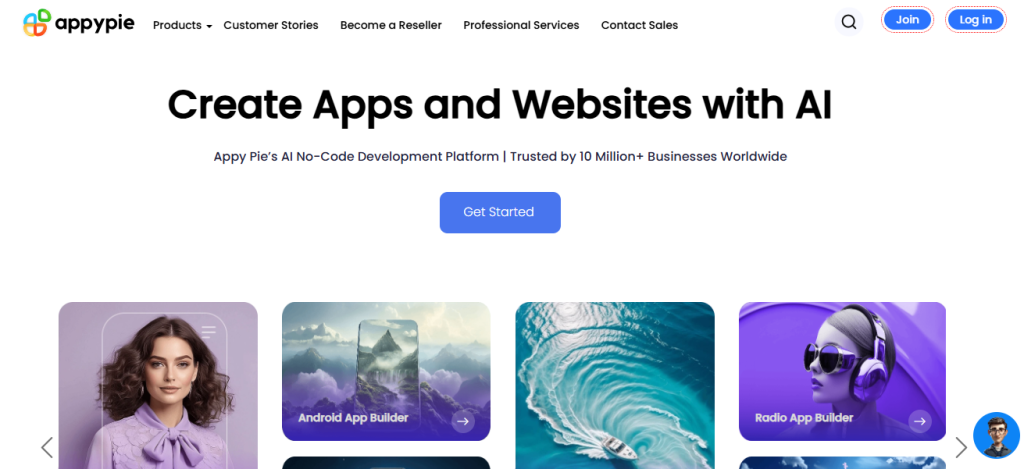
Appy Pie is an AI e-commerce website Builder is a simple and easy tool for anyone who wants to make an e-commerce website. You do not need to know how to code or have any technical skills. The builder comes with a drag-and-drop feature that lets you design your website step by step. It also includes features like a shopping cart and secure checkout to help you sell your products online.
The platform uses AI to make the process even easier. A helpful guide walks you through choosing a theme, picking your colors, and adding your logo. Just type in your business name and a few other details, and the platform creates your website in just a few seconds. It also has an AI tool that writes product descriptions for you. These descriptions are catchy and good for search engines, helping more people discover your store online—something product development companies can leverage to improve product visibility and market reach.
7. Canva: AI Designing

Canva is a graphic design platform that helps users create designs easily for social media posts, infographics, presentations, and more.
Canva AI helps users ease their design process. Let us take the Canva AI background remover tool, for example. Instead of manually outlining the areas to remove, the Background Remover tool lets you delete the background in minutes.
8. Intercom: Chatbot

Intercom is a comprehensive customer communication platform that goes beyond traditional chatbot capabilities. While its AI-driven chatbots functionality is excellent, it integrates with other tools to provide a holistic customer experience.
AI powers the Intercom’s chatbot and can handle many customer inquiries, from basic FAQs to more complex issues. It can be customized to match your brand’s personality and provide tailored responses.
Beyond chatbots, Intercom offers customer messaging, in-app messaging, email marketing, and customer support features. This integrated approach helps users create meaningful connections with their customers across multiple channels.
By centralizing customer interactions, Intercom provides valuable insights into customer behavior and preferences, helping them make data-driven decisions.
9. ViSenze: Provides Visual Search and Cross-Selling Capabilities

Another AI tool for ecommerce on our list is Visenze. This tool revolutionizes product discovery by replacing traditional keyword searches with intuitive image-based queries. This award-winning visual search platform leverages advanced computer vision technology to empower users to find what they are looking for accurately.
This helps the users to eliminate the language barriers and dive into the world of visual inspiration. Visenze redefines how consumers explore and purchase products.
10. Marlee
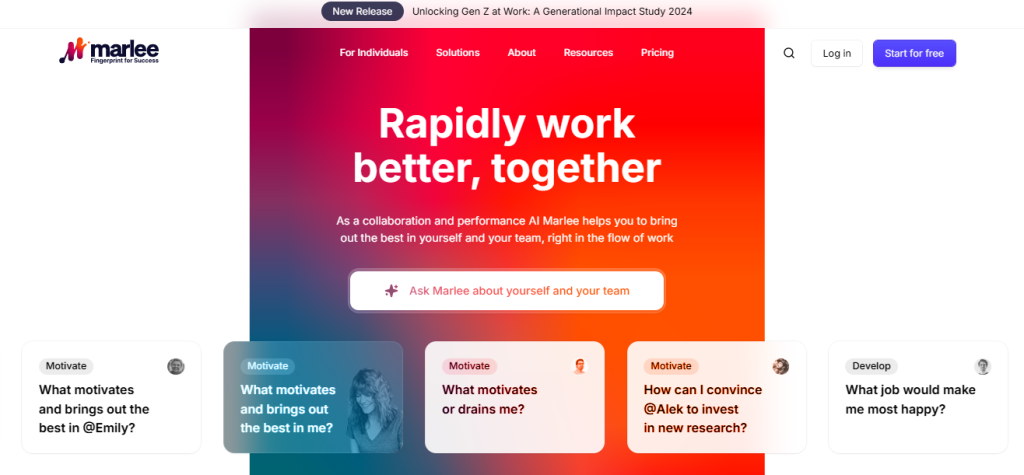
Marlee is a collaboration and performance AI that transforms how ecommerce businesses hire and develop talent. Streamlining the hiring process with data-driven insights helps identify candidates whose skills and values align with the company’s needs.
Marlee minimizes bias, enhances decision-making, and supports the creation of diverse, high-performing teams primed for success.
Beyond hiring, Marlee empowers sales teams with real-time analytics and personalized coaching to improve performance and collaboration. Its focus on continuous learning and teamwork drives sales growth and elevates customer experiences, making it an invaluable asset for ecommerce businesses.
11. Fluig AI – AI diagram tool

Fluig is a free AI diagram generator that stands out for its AI-driven design, which helps to turns your messy business ideas, files or even codes into clear, sharp mind maps, flowcharts, cards, tables and even artiles with natural AI chatting. No any manual work required.
It would be used in nearly all of your business phrases and teams to streamline your communication and collaboration at least 2 times faster.
There are far more features that are competely different the traditional diagram generators, saving you not just hours and days.
Key Features:
- AI-drive experience – all of your diagram generation requirements can be done with just AI chats, no need to build everything with any manual blocks as before, all with AI, in just seconds!
- Turn content into diagrams instantly – Upload PDFs, Word docs, images, or links, and Fluig auto-generates smart diagrams.
- Switch formats freely – Convert a mind map to a flowchart or Kanban board with a click.
- Great for teamwork – Collaborate live on a shared canvas with comments and sticky notes.
- Free and easy to use – No design skills or paid plan needed to get started.
- Easy to share – export your diagram as images, files, PDF or even demonstrate your diagram ideas with a live slideshow in just a single link.
12. Freepik AI Image Generator: AI-powered visuals
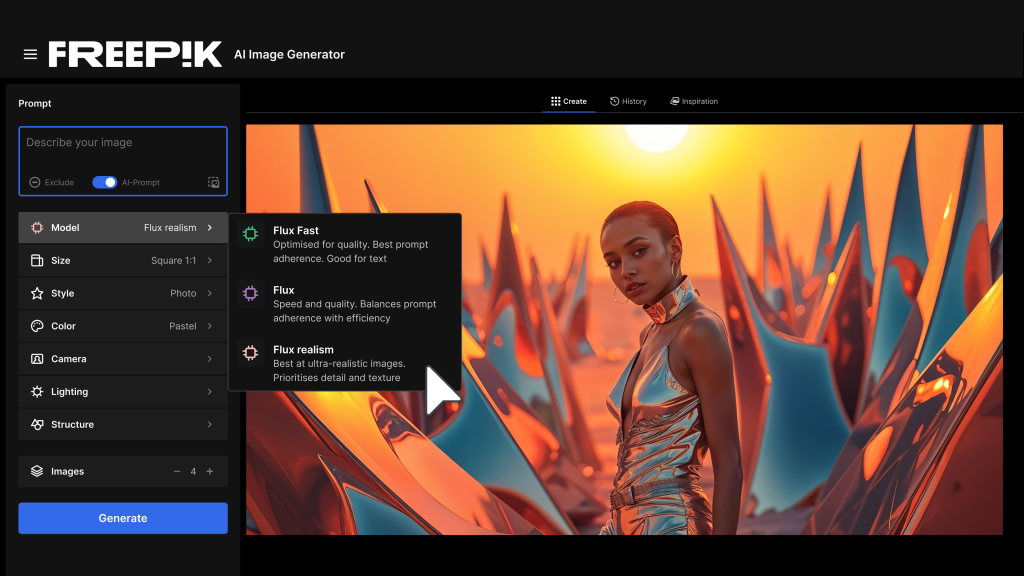
Freepik AI Image Generator makes content creation easier for e-commerce brands by transforming text prompts into high-quality visuals in seconds.
With advanced modes like Flux and Imagen 3, the Freepik AI Image Generator creates professional-grade images across photography, illustration, 3D, and other styles ideal for product listings, social media, and marketing campaigns.
Customization is key, allowing brands to create unique visuals with custom styles and characters. As part of the Freepik AI Suite, it integrates with other AI-powered tools like background removal, text generation, and upscaling, ensuring that every image is polished and optimized for online retail without requiring advanced design skills.
13. Medallia: Understand customer sentiment

Medallia is another top AI tool for e-commerce. It empowers organizations to truly understand their customers by capturing and analyzing feedback across multiple channels, from surveys and social media to reviews and customer support interactions. Medallia provides a comprehensive view of customer sentiment.
This helps them transform raw data into actionable insights. Medallia helps businesses identify trends, uncover pain points, and measure customer satisfaction. These insights can be leveraged to enhance products, improve customer experiences, and drive overall business growth.
14. Salesforce Einstein: AI-Driven Insights to Predict Deal Outcomes

Salesforce Einstein is a powerful AI-powered tool designed to optimize sales processes and boost performance. This helps them to leverage the power of data. For instance, effective Salesforce data archival strategies ensure that sales teams can access relevant historical data quickly, maintaining efficiency. With the guidance of experienced Salesforce Einstein consultants, organizations can better configure AI-driven insights, automate recommendations, and align analytics with real business goals. As a result, Salesforce Einstein provides its sales team with valuable insights to help them make informed decisions.
From predicting deal outcomes and identifying high-potential leads to automating routine tasks, this tool helps sales reps focus on building relationships and closing deals. This makes the tool the best in the industry, improving its accuracy and effectiveness. For teams looking to enhance their visual communication, loom alternatives provide streamlined ways to record and share videos, making content creation faster and more engaging.
15. Peak AI: Offers AI-Driven Audience Segmentation

Peak AI specializes in understanding customers on a deeper level. It leverages AI to segment audiences based on various factors, enabling businesses to tailor their marketing efforts and deliver personalized experiences.
16. Reply.io: Uses AI to Automate Email Outreach

Reply.io helps users add a pinch of AI to their sales outreach process, streamlining it and pushing the team forward to close more deals.
It tackles repetitive tasks, such as crafting personalized messages with dynamic content and automating the delivery process based on specific triggers.
Reply.io is an AI-powered assistant that can generate complete messages in seconds, even personalizing greetings at scale. As one of the best AI email assistants, it streamlines communication, saving time while maintaining a personalized touch.
reply.io provides real-time insights into email open clicks and replies. The outreach continues beyond email; this tool allows you to connect with prospects across multiple challenges like social media platforms, maximizing the scope for engagement.
17. Banuba: AI-Powered AR & Virtual Try-On
Banuba is an AI and AR technology company that helps eCommerce brands create immersive shopping experiences. Its solutions allow customers to virtually try on products such as makeup, glasses, and fashion accessories in real time, reducing uncertainty and boosting purchase confidence.
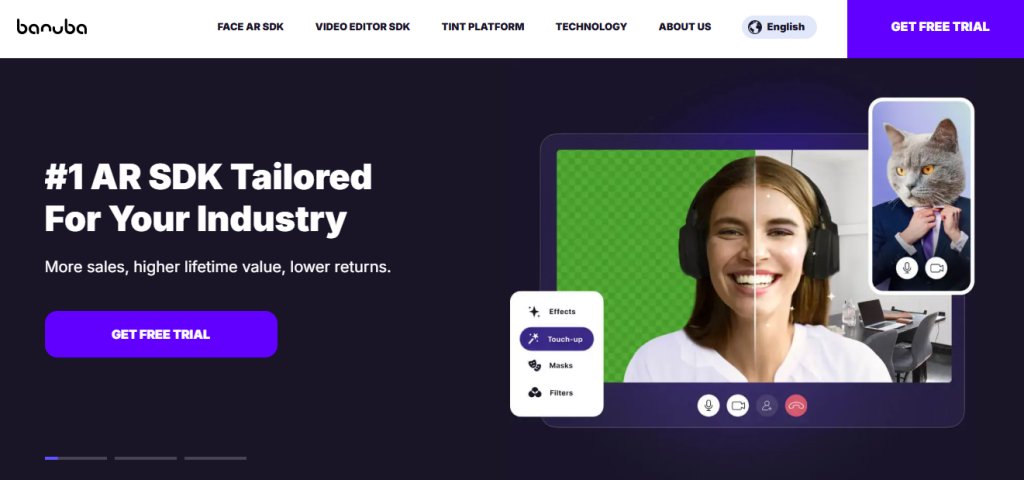
Beyond try-on, Banuba offers a suite of computer vision tools like face tracking, gesture recognition, and background removal—making it easier for businesses to create engaging video ads, product demos, and interactive shopping features. Compatible with iOS, Android, web, and Unity, Banuba empowers retailers to deliver personalized, interactive experiences that increase engagement and drive conversions.
Key Features of Banuba
- Virtual try-on for beauty, eyewear, and fashion items
- AI-powered background removal and beautification
- Real-time face tracking, filters, and AR effects
- Cross-platform SDKs (iOS, Android, Unity, Web)
- Tools to create engaging AR-driven marketing content
18. Sprout Social: Offers AI-Driven Social Media Listening

Sprout Social is a robust platform that enables businesses to manage and understand their social media presence effectively. Its AI-driven social listening capabilities offer unparalleled insights into audience sentiment, trends, and competitor analysis.
It also helps users monitor conversations across various platforms. It helps the brands recognize the opportunity to address their problems immediately and measure the impact of their social media efforts.
Beyond social media listening, Sprout Social provides a comprehensive suite of tools for publishing content, engaging with audiences, and measuring performance.
19. Frase: Creates AI-Generated Content

Frase is an AI-driven content creation platform that helps produce high-quality content. It uses advanced natural language processing to generate ideas, outlines, and even complete articles based on specific topics and keywords.
Frase’s AI extends beyond content generation. It also offers search engine optimization suggestions, helps with competitor analysis, and provides insights and preferences. It helps users automate time-consuming tasks and provides data-driven recommendations.
20. Synthesia: Creates realistic AI-Generated Videos

Synthesia is a groundbreaking platform that transforms text into realistic AI-generated videos. With its advanced features and AI technology, Synthesia can create videos featuring visual avatars that speak different languages and tones, making it a versatile tool for various applications, including AI voiceover for video.
From marketing and e-learning to customer support and internal communications, Synthesia offers a wide range of possibilities. This AI video maker eliminates the need for professional video production, saving time and resources while delivering high-quality, engaging video content.
21. Logo
LOGO.com is an AI logo creator that simplifies brand identity creation for e-commerce businesses. With an intuitive design process, users can create logos in minutes—no design skills required. The platform offers a vast library of templates, customization options, and instant branding tools, making it easy to create a unique logo that fits your brand. Whether you’re launching a new store or rebranding, LOGO.com provides a seamless and affordable solution for crafting a standout visual identity.
22. Typeface

Typeface, the generative AI platform for enterprise content creation, allows marketing teams to produce targeted, on-brand content for customer journeys, ad campaigns, and websites.
It offers personalization, integrated workflows, and enterprise-level security features, allowing e-commerce brands to accelerate production, scale personalized content, and enhance campaign effectiveness across multiple channels.
Working with Microsoft, Google, and Salesforce, Typeface provides comprehensive AI-driven content solutions to streamline content creation and marketing.
Typeface offers two main solutions: Typeface Hub and Typeface Arc. Hub is designed to help marketing teams create personalized marketing content, including ads, social posts, blogs, and emails.
It comes with a Copilot that helps you create, edit, and repurpose content using AI templates and Magic Prompts. Typeface Arc streamlines the management of marketing campaigns with features such as journey and campaign orchestration, curated storyboards and feeds, proactive insights and recommendations, and native publishing capabilities.
23. Narrato

Narrato is an AI content platform designed for eCommerce brands and online retailers. It offers over 100+ AI tools and templates for creating marketing content. These include an AI bulk product description generator, an AI copywriter, an AI blog writer, an AI social media post generator, and an AI ad copy generator. These tools enable the creation of high-quality content quickly, helping to boost conversions in a short time.
The platform also offers AI SEO tools (SEO brief generator, AI keyword generator, SEO meta title & description generator) to make your marketing content SEO-friendly. Additionally, it supports one-click publishing across all social media platforms, including Webflow and WordPress, as well as any other platform or CMS.
And there’s more. Narrato provides powerful content project management and collaboration tools, making it a comprehensive solution for eCommerce marketing and content creation.
24. Hostinger: AI Domain Name Generator

Hostinger is a reputable web hosting provider and an intelligent solution for businesses looking to facilitate their online presence. It can be one of the great AI tools for e-commerce as it leverages AI to create layouts, content, and designs based on input. Users can easily customize their sites using the drag-and-drop features. Hostinger also provides users with a heatmap tool to see where visitors click.
25. Shopify: AI Website Builder

Shopify is one of the best AI tools for e-commerce platforms that lets anyone start and grow their business online from scratch. You can hire a Shopify expert to build an online store, manage sales, and accept payment in digital and physical stores. It was also featured by Cybernews as one of the best ecommerce website builders, thanks to its robust feature set.
Shopify has its own AI website builder, named Shogun. It provides accessible drag-and-drop features. Users need prior knowledge of code or are afraid of the learning curve. This means that even a non-technical person can now create an e-commerce website.
The Shopify AI website Shogun allows users to create impressive pages in seconds. With only a few user prompts, the website creates website sections. It also provides an AI-based copywriter that lets users add catchy product descriptions.
26. ReferralCandy: Referral, Affiliate & Influencer Program Automation
If you’re building growth loops that don’t rely on paid traffic alone, ReferralCandy sits alongside your AI stack by automating referral, affiliate, and influencer marketing in a way that’s measurable and easy to operate. It’s commonly used to track partner-driven sales, manage rewards/commissions, and keep programs running without manual spreadsheets.
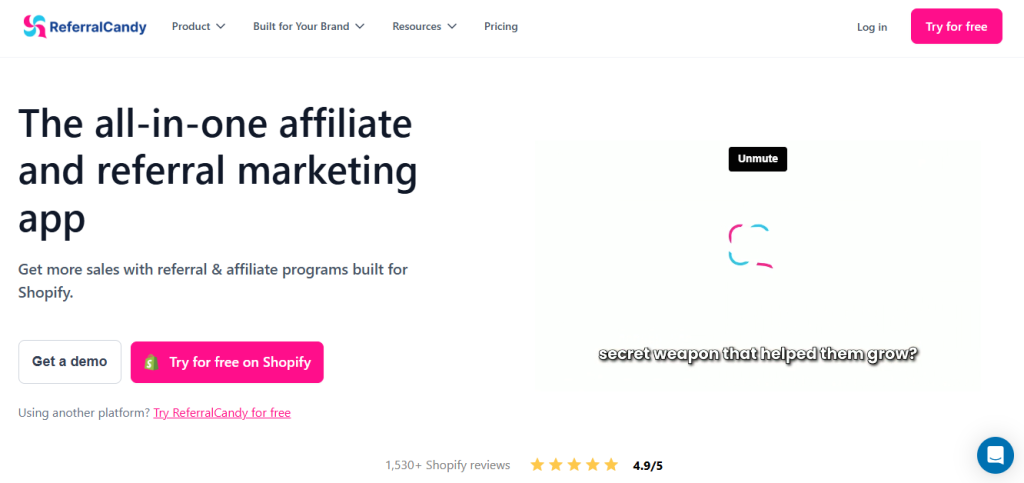
Conclusion
Integrating artificial intelligence (AI) in e-commerce can help businesses enhance their online presence, increase sales, and improve the overall customer experience. By enhancing the right AI tools for e-commerce businesses and incorporating them into their current systems, business owners can drive long-term growth and maximize the potential of their business ideas.
To adopt AI in Ecommerce, businesses must first understand the AI application landscape.
According to Bloomreach’s data, the e-commerce AI market is expected to reach $45.72 billion by 2032. 84% of ecommerce businesses place AI as their top priority.
And keeping that in mind, it is clear that AI is here to stay and flourish. So, what is stopping you now? Pick the best AI tools for ecommerce (based on your needs), and see your business grow.
Frequently Asked Questions
Using AI tools in online stores comes with numerous benefits. Enhancing the customer experience using AI chatbots and automating the marketing strategy can help businesses enhance their ROI in many ways.
Choosing the right AI tools for ecommerce business is based on various factors. For example, if your business requires 24/7 customer support, you can opt for an AI chatbot.
